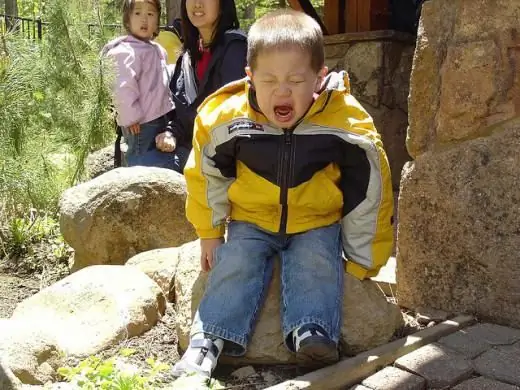2026 Author: Priscilla Miln | miln@babymagazinclub.com. Last modified: 2025-01-22 17:55:21

How to communicate with a child, Gippenreiter Yu. B. reveals in the pages of his book, which has gained popularity among parents around the world.
The main thing in communicating with a child is unconditional acceptance and unconditional, unconditional love. It is unconditional, i.e. "just like that", just the way it is and only for what it is. To learn how to communicate precisely from the point of view of a loving and accepting parent, and not an indignant and expressing claims, to help find a solution to the problem without putting pressure on the child, to teach to bear some responsibility for the consequences of such, Yu. Gippenreiter suggests.

According to the author, when expressing dissatisfaction with any actions of a child, one can discuss and criticize only actions and deeds, as well as their consequences, but in no case the child himself. Andbe sure to emphasize that his action upset you, but this did not affect your attitude towards the child, but only greatly upset you. Those. even blaming the actions of the child, we let him know that he is still important and valuable to us, says Julia Gippenreiter. You should constantly communicate with the child, discuss everything that interests him, speak on any topic, openly and confidentially. However, not only the child, but also the parent is not always ready for this.
Listen to hear
So how to communicate with a child? Gippenreiter Yu. B. advises you to master the technique of "active listening", which allows you to establish contact with the interlocutor and show that his problems are close to you, that you understand him and empathize. It is described in detail in the book by Yu. Gippenreiter “Communicate with a child. How?" According to the author, building the right dialogue and setting the child up for communication are the first steps towards solving the problem.
Another technique that allows you to decide how to communicate with a child, Gippenreiter Yu. B. calls the method "I - messages". With its help, you can express your attitude, namely your feelings about the current conflict situation, without giving an assessment to the actions of the interlocutor. An example of "I - messages" is the phrase "I was very upset because of today's quarrel" instead of "You - messages" "You behaved disgustingly, and I was upset." "I - messages", according to the author, do not blame, but only express your attitude to what happened, which is important in communicating with any person, and even more so with a child, teenager. Thanks to this method of communication, the child’s self-esteem does not suffer, he is not offended.self-esteem and no defensive backlash.
Theory and practice

And how to motivate a child to something, overcome resistance without breaking it and without crushing parental authority, how to find a common language with a "difficult" teenager, overcome alienation and isolation? The book contains dozens of practical tips and real stories that clearly illustrate the solution to many typical situations. After each section, homework is given to practice one or another method of communication. Doing them will allow you to master practical techniques and retrieve them from the nooks and crannies of memory at the right moment.
To the question: "How to communicate with a child?" Gippenreiter Yu. B. does not provide a single correct answer. She offers to think, improve, empathize, learn to think outside the box, accept the child unconditionally and, first of all, remember that he is a beloved, dear and infinitely dear person to you.
Recommended:
The husband hates the child from his first marriage: what to do? Consequences of a husband's hateful attitude towards his wife's child from a previous marriage

Should a woman marry with a child? Of course, when a second marriage is concluded and the spouse has children from the previous one, then on the one hand it is simply wonderful. After all, the woman decided to get rid of her past and rushed to a new life, starting all over again. However, she will no longer be able to build relationships literally from scratch
The child does not want to communicate with children: causes, symptoms, character types, psychological comfort, consultations and advice from a child psychologist

All caring and loving parents will worry about the isolation of their baby. And not in vain. The fact that a child does not want to communicate with children can be a sign of a serious problem that will affect the formation of his personality and character in the future. Therefore, it is necessary to understand the reasons that force the baby to reject communication with peers
A child of 3 years old does not obey: what to do, the psychology of the child's behavior, the causes of disobedience, advice from child psychologists and psychiatrists

It is quite a common situation when a child of 3 years old does not obey. What to do in this case, not all parents know. Many of them try to calm the child with persuasion, shouting and even physical impact. Some adults just go on about the baby. Both of them make mistakes. Why does a three-year-old child not obey and how to stop it? This post will answer these questions
Child (2 years old) often freaks out and is naughty. The mental state of the child. Hysteria in a child

Expecting a baby is always full of joyful dreams, plans and hopes. Parents paint their future life with a baby in bright colors. The son or daughter will be beautiful, smart and always obedient. The reality turns out to be somewhat different
Book or e-book - which is better? The books are old. Wexler eBook

It is difficult to overestimate the importance of the book in the fate of mankind. Over the centuries, she passed on the knowledge accumulated by previous generations, educated, developed the imagination and gave moments of delightful escape from reality. During this time, the book has managed to repeatedly change its form, and modernity demonstrates the electronic version. Both the printed tome and the reader have their positive aspects and admirers, disputes between which only flare up

